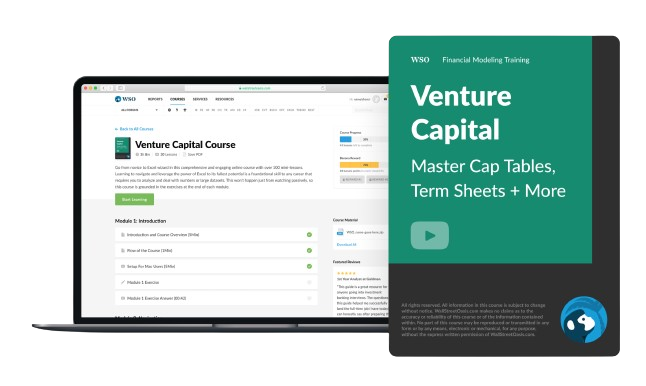Venture Capital Salary Guide
Overview of compensation in the Venture Capital industry
Society advances through innovation. However, “new venture” is spelled as costs-and-a-bucketload-of-risk, which results in external financing being the most convenient solution, primarily to spread the risk of failure.
In return for shouldering part of the risk burden, investors investing in such companies receive equity at supposedly discounted valuations. This marriage of convenience gives startups access to funds, allows them to reduce risk, and generates attractive returns for investors.

Venture capital (VC) is a subset of private equity. By definition, it refers to the financing startups and small businesses with exceptional growth potential receive in exchange for, usually, an equity stake.
However, the transaction may not always be monetary as some VCs offer technical know-how or managerial expertise instead of briefcases full of cash.
VC investors, called venture capitalists, often include VC firms, high-net-worth individuals (angel investors), and other financial institutions. They may also include Crossover VCs – a term given to VC arms of PE firms and Hedge Funds. Moreover, VC employees may also sometimes be called venture capitalists.

VCs looking to hire generally want those with not only technical knowledge but also a passion for startups and the ability to understand the market.
That said, late-stage and growth equity firms care more for technical skills and deal experience, such as those gained in IB and PE, while early-stage firms look at a candidate’s ability as a business development professional who can network and find diamonds among rocks.
We see some of you shaking your heads, saying, “Bro. Bro. I just wanna know how much $$$ I can make.” We hear you; you can stop now. Here’s a summary of what people in VC make at various levels.
| Role | Compensation Excluding Carry | Share In Carry |
|---|---|---|
| Analyst | $60-000 - $210,000 | Unlikely |
| Associate | $70,000 - $350,000 | Unlikely |
| Senior Associate | $150,000 - $480,000 | Small |
| Principal or Vice President (VP) | $140,000 - $340,000 | Increasing |
| Junior Partner / Partner | $400,000 - $600,000 | Large |
| General Partner / Managing Director | $500,000 - $2,000,000 | Significant |
VC comp by Role
One thing to keep in mind is that the firm hierarchy in the VC industry is not standardized… like, at all.
Some firms keep the flattest structure ever with only Partners and Admin staff, while others follow a very hierarchical structure. Some firms combine the Principal and the VP roles, and some may separate Analysts from Associates. Further, some firms have a single level for all Partners, whereas others have two or even three levels for Partners.
For the sake of simplicity (and to make writing this article possible), here’s a generic structure we will follow.
- Analyst
- Associate (Pre-MBA)
- Senior Associate (Post-MBA)
- Principal or VP
- Partner / Junior Partner
- Senior Partner / General Partner

Analyst
This role involves number-crunching, market research, support work, and helping with internal processes. Analysts also help Associates with due diligence.
They can expect to gain knowledge of finance and market analysis. But in the VC context, their role in the deal process is limited. As a result, the role is seen as a training phase.
Most Analysts leave after a couple of years for an MBA, to move to another firm as a pre or post-MBA Associate, or even to join a portfolio company (portco). While internal promotions aren’t unheard of, they are just not as common or systematic as in investment banking.
They can expect to earn a base comp between $60,000 and $130,000 and to bag a bonus between $15,000 and $90,000 depending on geography and the firm type.
What was that? Did you ask, “And there’s carry too, right?” That’s funny. But we’ll quote an oracle here – “No.”
Associate
A pre-MBA Associate role is earned after working in IB, consulting, sales, or business development, or gaining other relevant experience. It’s a broad range, but you get the idea.
Later-stage VC firms are closely related to PE in the sense that Partners, Principals, and VPs source deals. (Also, both care a lot about stable cash flows.) On the contrary, Associates at early-stage firms do most of the deal sourcing and, in addition, weed out poor investments to find startups worth investing in and present them to Principals or Partners.
Like Analysts, they too usually leave for an MBA or to join another company in another industry after a few years.
Even though workweeks are seemingly far shorter than in IB at about 50-60 hours, the role requires a lot of out-of-office work, thus making it anything but a 9 to 5. But it’s nothing like the cube environment in IB; we’ll give it that.
The base comp offered to pre-MBA Associates is typically between $70,000 and $200,000. The bonus can fall between $30,000 and $150,000 to form a total comp ranging between $100,000 and $200,000.
What’s that again? Carry? Well, yeah… Maybe. Established firms are much less likely to offer carry than a new shop where you may be offered carry but will also take home lesser in base-and-bonus.

Senior Associate
Someone who has made Senior Associate is probably aiming for Partner, or at least is on track to Partner. They are to Partners and Principals what Analysts are to them, acting as their apprentices and support.
While the role can be earned through direct promotion, it’s rare for it to be that way. Most Senior Associates get to where they are after completing an MBA. In VC firms specializing in niche spaces, they may hold Ph.D. but may not have business or finance expertise.
Those who aren’t promoted further are pretty much at a dead-end in the industry. They then lateral to other industries or take up a finance role at a portco.
Total comp figures range from $100,000 to $300,000 and the bonus from $50,000 to $180,000. The share in carry can go up to 2%, which may not get the total comp to 7 figures but may close to double it.
Principal / VP
A.k.a. Partners-in-training, Principals or VPs are usually the senior-most members on the investment team who are directly engaged in negotiations and deal execution. They are expected to have knowledge of the technical aspects as well as the business case of a potential investee.
Although they play a major role in deal execution, they don’t have the final say in investment decisions. But unlike Associates who are merely Board observers, VPs sit on Boards and work with portfolio companies.
Direct promotions are more prevalent at this level than lower in the hierarchy. It is also uncommon to see people lateraling into this role and above from other industries.
To earn a considerable chunk of carry, they must satisfy Partners and prove they can add enough value to the firm, which may include bringing home unique deals or saving troubled portfolio companies.
Total comp is likely to fall between $140,000 and $340,000, most of it coming from a base comp ranging from $140,000 to $250,000. Although far tinier than a Partner’s share, carry of up to 4% may be offered to VPs.

Partner / Junior Partner
Some VC firms include this role in the corporate structure, while others skip it. More often than not, Junior Partners are promoted internally, although subject matter experts and entrepreneurs with a great track record may join VCs at this level too.
Like GPs, they are engaged with portfolio companies and their Boards and LPs. At the same time, they are engaged in deal execution like Principals. It’s quite evident how the role fits between Principals and GPs. As a result, their wages fall between what those in the two adjacent positions earn.
Their total cash comp is likely to be in the range of $400,000 to $600,000. They are next in line after GPs in the carry distribution waterfall. Their share in carry may go up to 8%.
General Partner / Managing Director
We bet $100 that some of you apes jumped straight to this part. Well, read on then.
GPs are usually successful entrepreneurs or executives with fabulous records. Alternatively, they may have been internally promoted to that level.
Although finding the next Tesla, Amazon, or Google would be a golden ticket to the GP seat, Junior Partners don’t need to find pink diamonds to get there. A track record of finding regular diamonds does the job.
They mostly spend their hours on fundraising, public relations, final investment decisions, serving on portfolio companies’ Boards, and human resources.
GPs may earn a total cash comp between $500,000 to $2,000,000. Their carry, however, can multiply the total cash comp number into a much bigger number. Although GPs’ share in carry may normally range between 4% and 20%, there are outlier cases where they may earn less than 4% or, in rare cases, as high as 30%.
Here’s a summary table presenting how much people in VC take home each year.
| Role | Compensation Excluding Carry | Share In Carry |
|---|---|---|
| Analyst | $60-000 - $210,000 | Unlikely |
| Associate | $70,000 - $350,000 | Unlikely |
| Senior Associate | $150,000 - $480,000 | Small |
| Principal or Vice President (VP) | $140,000 - $340,000 | Increasing |
| Junior Partner / Partner | $400,000 - $600,000 | Large |
| General Partner / Managing Director | $500,000 - $2,000,000 | Significant |
VC compensation by region
New York, Silicon Valley, Los Angeles, and Boston are among the few places in the US that are considered hotspots for venture capitalists.
While the Valley pays VC Analysts the highest base comp of $96,000, New York competes by offering the highest bonus at $28,000, which helps it pay its employees the highest median cash comp as well ($123,000).
Although the Valley generously pays the highest median base of about $136,000, LA takes the W in Associates’ eyes where their kind earns the highest median cash comp of $185,000.
VC Senior Associates must be willing to flock to the Valley as it pays them the highest median base comp as well as the highest median bonus of $165,000 and $45,000, respectively, bringing their total cash comp to $210,000.
Once again, the Valley attracts the most people at the Principal level by offering them a median total cash comp of $256,000 which comprises a base comp of $200,000 and a $56,000 bonus.
VC comp by firm type
Crossover VCs aside, comp in VC doesn’t drastically vary depending on the firm type (Corporate and Institutional). Crossover VCs offer significantly higher comp as they are probably accustomed to paying employees more in their PE and Hedge Fund businesses.

Corporate VCs are often formed as independent divisions of companies or as designated teams off their company’s balance sheet. They have pretty much the same goal as Institutional VCs, which is investing in high-growth companies that generate value for them as shareholders.
Tech and healthcare giants (like Google Ventures, Dell Ventures, Cisco Investments, Johnson & Johnson Innovation, and Intel Capital) already had a significant presence in the VC industry. But now, a recent influx of new entrants into the space is evident from new corporate VCs ranging all the way from convenient stores (7-Eleven) to automakers (GM investing in Lyft).
Institutional VCs, firms traditionally referred to as VCs, manage funds of millions (and oftentimes, billions) of dollars in assets under management (AUM). The enormous sums of capital come from limited partners (LPs), the fund’s investors, and are managed by general partners (GPs), the fund’s partners. GPs are responsible for running the fund and making investment decisions.
Some of the notable Institutional VCs are Tiger Global Management, New Enterprise Associates, Sequoia Capital, and DST Global.
“Yeah, just tell me how much they pay already.” Alright, alright. We were just getting there.
Analysts can expect to earn a base comp between $60,000 and $95,000 working at a Corporate VC and up to $130,000 working at an Institutional VC. Institutional VCs pay Analysts more in base comp as well as bonus.
The numbers are more competitive at the Associate level. Where Corporate VCs offer $90,000 to $180,000 in base comp, Institutional VCs offer $80,000 to $200,000, and both offer a bonus of about $100,000.
While Corporate VCs pay Senior Associates $171,000 in median total cash comp, Institutional VCs pay a little more at $185,000, with the difference primarily coming from the bonus component.
Principals earn a similar median comp at both Corporate and Institutional VCs in base comp as well as bonus. However, the pay range at Institutional VCs is much broader. While Corporate VCs pay a base comp between $160,000 and $234,000, they pay between $100,000 and $350,000.
| Roles | Corporate VCs | Institutional VCs |
|---|---|---|
| Analyst | $60,000 - $95,000 | $60,000 - $130,000 |
| Associate | $90,000 - $180,000 | $80,000 - $200,000 |
| Senior Associate | ~$171,000 | ~$185,000 |
| VP / Principal | $160,000 - $235,000 | $160,000 - $235,000 |
VC comp by firm stage
While there’s no universal model, most firms follow a similar set of steps in VC financing ranging from the pre-seed stage to the late stage.
The differences in compensation mainly arise from the fact that firms investing in pre-seed stage firms have a smaller Assets Under Management (AUM) base, so they tend to pay lower salaries. On the contrary, growth- and late-stage firms can have billions under management and can afford to hand out bigger paychecks.

Pre-seed / seed stage VCs
The stage in which entrepreneurs build their product or service prototype to evaluate the feasibility of an idea is known as the pre-seed stage. It precedes the other stages and is followed by the seed stage, where the company has some experience and can demonstrate its growth potential. VCs that invest in initial stages companies are likely to pay their employees much lower than other VCs.
Analysts at a pre-seed and seed-stage VC earn a base comp between $60,000 and $120,000 and a bonus ranging from a daily cup of coffee to $15,000. Associates, once again, are not promised a bonus but may earn double the bonus Analysts do. The upper ceiling in their base comp is lifted to $135,000.
A Senior Associate at these firms may earn a base comp between $70,000 and $175,000 and a bonus of anything between two cups of coffee every day and $55,000. VPs celebrate the new base comp floor of $130,000 and the new bonus ceiling of $85,000.
Early-stage VCs
Next comes the early-stage VC firms who invest in companies a plan that will generate long-term profits. The funding mainly supports manufacturing, sales, and marketing. They want to see stellar performance metrics evidencing a commercially viable product or service that merits future fundraising.
Analysts may as well work at pre-seed VCs if their base comp was the only number in question, but the bonus ceiling at these firms is more than double compared to those firms. Positions starting at the Associate level see a significant boost in income. Associates earn a median total comp of $155,000, comprising of a $130,000 base comp and a $25,000 bonus. Their base comp ceiling rises to $200,000.

Growth and Late stage
These VC firms invest in companies on the growth path which have achieved success (somewhat). The additional funding helps the companies build new products, reach new markets, and sometimes, even acquire other companies.
Potential portfolio companies must show a stable revenue stream coming from a strong customer base. So given the higher level of safety from their portfolio companies, these VCs do not tend to rely on cutting corners to generate more profits. As a result, their employees’ bank accounts see bigger numbers.
Analysts earn a base comp of $80,000 to $105,000 and $20,000 to $90,000 in bonus. Associates earn a base comp of $100,000 to $180,000. While Associates see their bonus ceiling jump to $150,000, Senior Analysts see a significant jump in their base comp ceiling at $300,000.
Senior Associates can take home a whopping $300,000 in base comp and up to $180,000 in bonus after a good year. VPs at these VC firms showed the highest median cash comp of about $341,000 among all.
Stage Agnostic
While it is true that some firms can be stage-agnostic, there may not be many of them. They tend to pay somewhere between what early-stage and late-stage firms do. Associates can expect to earn a base comp between $100,000 and $140,000 and a bonus of up to $90,000.
Senior Associates flaunt a bigger paycheck comprising of a base comp that falls between $95,000 and $250,000 and a bonus that goes up to $175,000. Earning slightly than their peers at growth and late-stage VCs, VPs at stage agnostic firms take home a median cash comp of $336,000 formed by a median base comp of $252,000 and a big fat bonus of $83,000.

Carry in VC
Here’s the rules. (Well, not really. There’s no industry standard.)
- Smaller firm: More carry, less cash comp (base and bonus)
- Larger firm: Less carry, more cash comp
- Emerging firms: More carry, less cash comp
- Established firms: Less carry, more cash comp
If joining a smaller emerging firm, one would reasonably assume that you believe the firm can generate enough returns to make your share of carry amount to something.
Another rule. (This is an important one. Probably the only thing showing a hint of standardization in the industry.)
Vesting. Carry is typically unlocked after a few years. The vesting period may be as low as 2 years, but that’s rare, however. The median vesting period is 4 years. Nonetheless, many firms set the vesting period at the 8-year mark as well.
Additional Resources
Thanks for reading our salary guide! Please check out the following additional resources to help you advance your career:





or Want to Sign up with your social account?